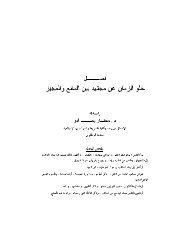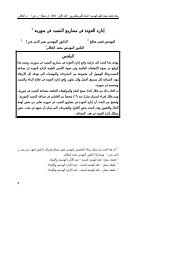Anderson's Winesburg, Ohio: The Individual in the Village Dr ...
Anderson's Winesburg, Ohio: The Individual in the Village Dr ...
Anderson's Winesburg, Ohio: The Individual in the Village Dr ...
You also want an ePaper? Increase the reach of your titles
YUMPU automatically turns print PDFs into web optimized ePapers that Google loves.
<strong>Anderson's</strong> <strong>W<strong>in</strong>esburg</strong>, <strong>Ohio</strong>: <strong>The</strong> <strong>Individual</strong> <strong>in</strong> <strong>the</strong> <strong>Village</strong><br />
In <strong>W<strong>in</strong>esburg</strong>, <strong>Ohio</strong>, Sherwood Anderson reflects on his youthful<br />
experiences <strong>in</strong> a small society that is undergo<strong>in</strong>g change. He writes about<br />
<strong>the</strong> village at a pre-motor time and portrays this society lyrically <strong>in</strong>fus<strong>in</strong>g<br />
his work with warm feel<strong>in</strong>gs towards <strong>the</strong> village and its people. A major<br />
feature of <strong>W<strong>in</strong>esburg</strong> is its small size. Its population forms a social group<br />
where <strong>in</strong>dividuals are aware of <strong>the</strong>ir position and <strong>the</strong> relationship that<br />
exists between <strong>the</strong> <strong>in</strong>dividual and <strong>the</strong> social group. Anderson portrays<br />
social sett<strong>in</strong>gs that were chang<strong>in</strong>g <strong>in</strong> <strong>the</strong> rural Midwestern villages of <strong>the</strong><br />
late ١٩th century /early twentieth century. However, <strong>the</strong> major concern<br />
of <strong>the</strong> <strong>W<strong>in</strong>esburg</strong> stories lies <strong>in</strong> <strong>the</strong> characters. Interest<strong>in</strong>gly, <strong>the</strong> basic<br />
issue discussed <strong>in</strong> <strong>the</strong> book, <strong>in</strong>dividualism, has drawn some critical<br />
attention s<strong>in</strong>ce it is one of <strong>the</strong> most highly prized qualities <strong>in</strong> American<br />
culture. I believe that Anderson portrays <strong>in</strong>dividuals suffer<strong>in</strong>g from an<br />
extreme emphasis on <strong>in</strong>dividualism that has made <strong>the</strong>m unhappy<br />
grotesques. <strong>The</strong> weight put on <strong>in</strong>dividualism br<strong>in</strong>gs <strong>the</strong>m unhapp<strong>in</strong>ess.<br />
<strong>The</strong>y lack fulfillment, feel separate, lonely, and unable to communicate.<br />
Although <strong>the</strong> book talks about <strong>the</strong> village before WWI, it was<br />
written dur<strong>in</strong>g <strong>the</strong> devastation of <strong>the</strong> war that changed <strong>the</strong> way <strong>the</strong><br />
citizens of <strong>the</strong> western world thought of <strong>the</strong>mselves and <strong>the</strong>ir place <strong>in</strong> <strong>the</strong><br />
universe. If <strong>the</strong> possibility for an <strong>in</strong>dividual to make a mark on <strong>the</strong> world<br />
existed and heroism and acts of valor were thought to be possible before<br />
<strong>the</strong> war, <strong>the</strong> general breakdown of <strong>the</strong>se notions by <strong>the</strong> war left many<br />
th<strong>in</strong>k<strong>in</strong>g of <strong>the</strong>ir landscape as a “wasteland.” It is through <strong>the</strong> prism or<br />
retrospect that <strong>W<strong>in</strong>esburg</strong> shows that <strong>the</strong> people of <strong>the</strong> village, <strong>the</strong> solid<br />
bedrock of American culture, have been los<strong>in</strong>g <strong>the</strong> pastoral tranquility<br />
afforded by common values and shared outlooks on life. <strong>The</strong> emphasis<br />
on <strong>the</strong> <strong>in</strong>fectious and ebullient <strong>in</strong>dividualism of Emerson, Thoreau, and<br />
Whitman appear to have twisted and thwarted Man’s ability to be<br />
effective fulfilled <strong>in</strong>dividuals capable of mean<strong>in</strong>gful thought and action.<br />
<strong>W<strong>in</strong>esburg</strong>, <strong>Ohio</strong> was warmly received when it appeared <strong>in</strong> ١٩١٩<br />
and its writer was hailed as a fresh new voice, and a rebel. <strong>The</strong> book was<br />
seen as show<strong>in</strong>g Anderson to belong to <strong>the</strong> group of writers who<br />
criticized life <strong>in</strong> <strong>the</strong> villages of <strong>the</strong> Midwest (Blankenship ٦٥٦). <strong>The</strong><br />
book received a good share of attention and analysis that accord<strong>in</strong>g to<br />
Walter Rideout has fluctuated from one decade to ano<strong>the</strong>r <strong>in</strong> <strong>the</strong> twentieth<br />
century. Anderson was first looked at as a rebel to be praised, <strong>the</strong>n a<br />
٣٨

















